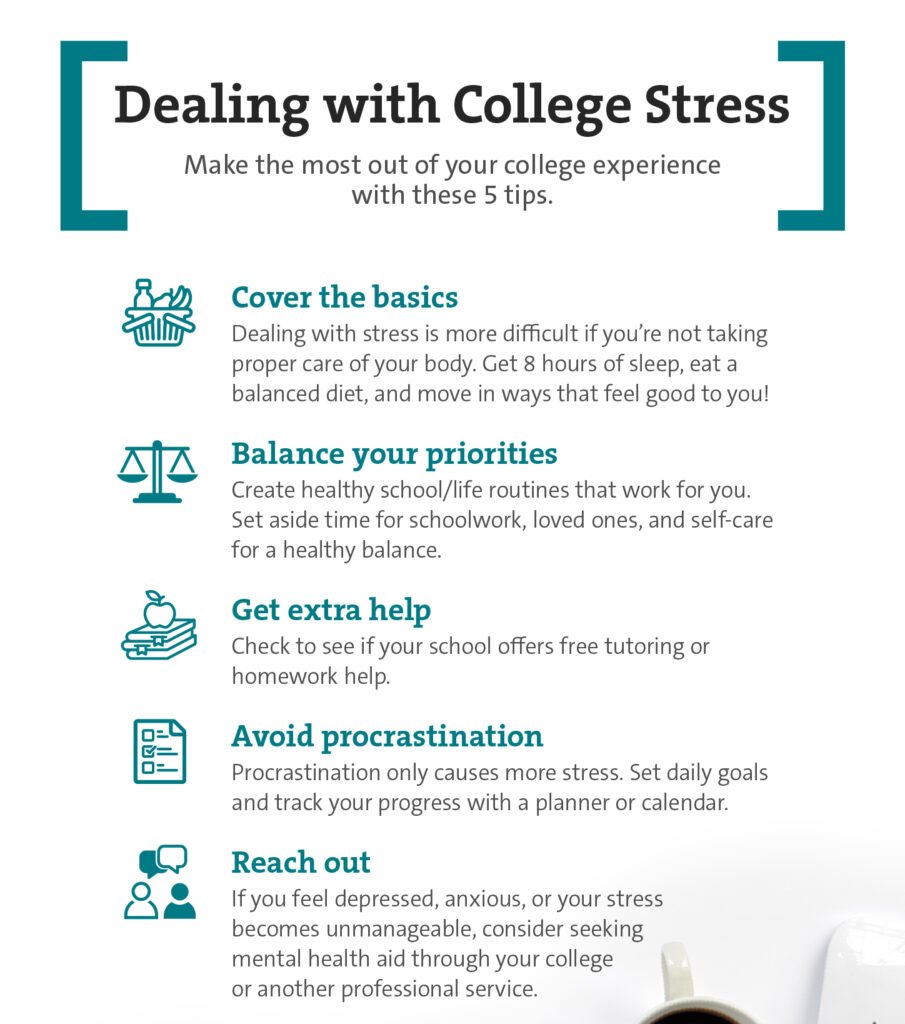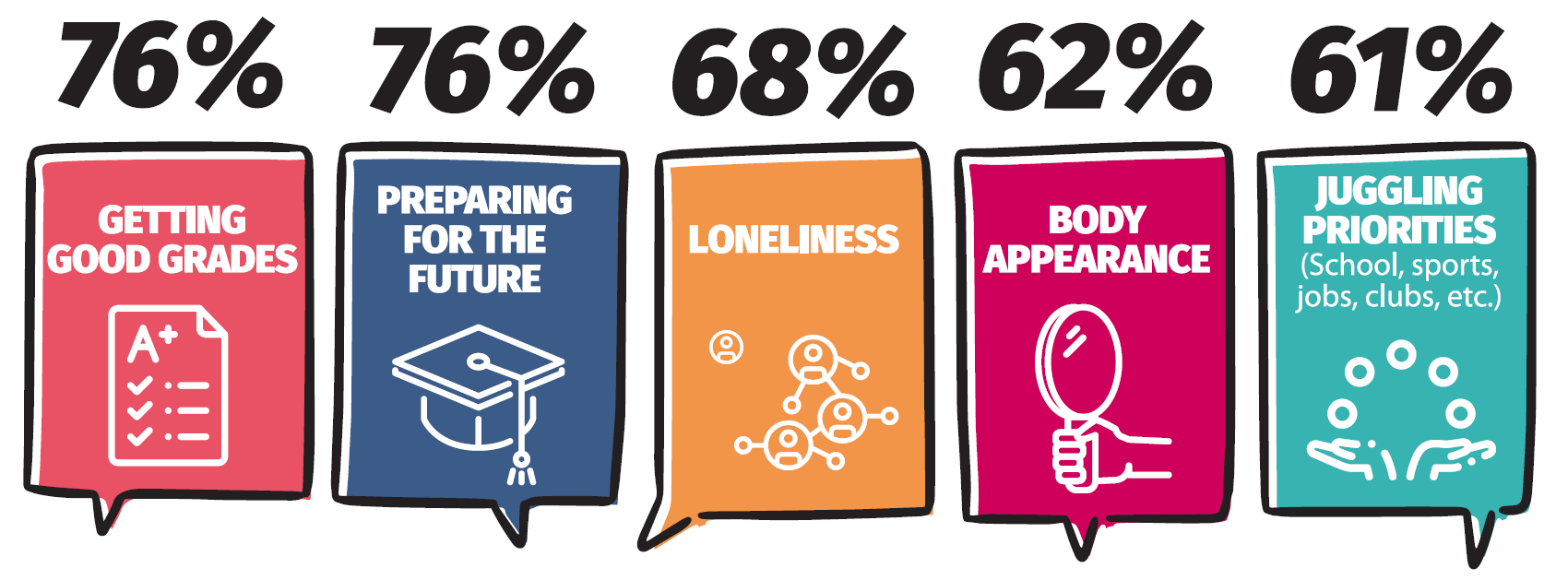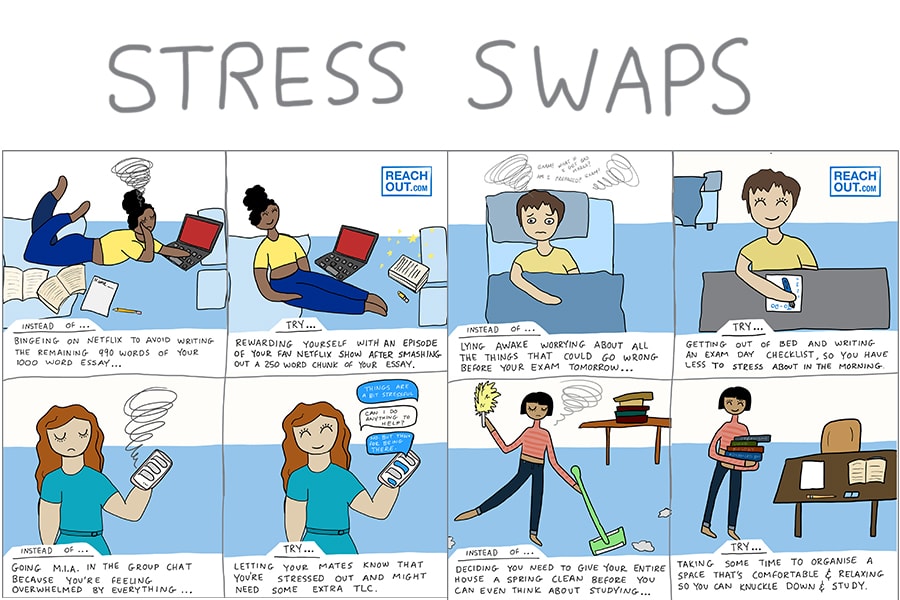Take a deep breath and assess your stressors. Prioritize tasks and seek support from friends, family, or school counselors.
School stress is common among students. Balancing assignments, exams, and extracurricular activities can feel overwhelming. Effective stress management is crucial for maintaining mental health and academic performance. Identifying specific stressors helps in tackling them more efficiently. Implementing techniques like time management, healthy eating, and regular exercise can reduce stress levels significantly.
Don’t hesitate to reach out to trusted individuals for support and guidance. Consistent communication with teachers and counselors can provide additional assistance and resources. Remember, managing stress is essential for overall well-being and success in school.
Recognizing Stress Signs
School can sometimes feel overwhelming. Recognizing stress signs can help you manage it better. Stress affects your body and mind. Identifying these signs early is crucial for your well-being.
Physical Symptoms
Stress can show through physical symptoms. These symptoms are your body’s way of signaling stress. Here are some common physical signs:
- Headaches
- Stomach aches
- Fatigue
- Muscle tension
- Sleep problems
If you notice any of these symptoms, take a break. Drink water, stretch, or go for a walk. Caring for your body can reduce stress.
Emotional Indicators
Stress also affects your emotions. Emotional indicators can be subtle or strong. Recognizing these signs helps in managing stress better. Common emotional signs include:
- Feeling anxious
- Feeling sad
- Getting easily irritated
- Feeling overwhelmed
- Difficulty concentrating
If you feel any of these emotions, talk to someone. Share your feelings with a friend, teacher, or family member. Sometimes, just talking can make you feel better.
Remember, recognizing stress signs is the first step to handling stress. Pay attention to your body and emotions. Taking care of yourself is important.
Prioritizing Self-care
Feeling stressed out from school? You’re not alone. Many students feel overwhelmed by their workload. Prioritizing self-care can help reduce stress and improve your well-being. Let’s explore some simple self-care strategies.
Healthy Eating
Eating healthy foods can make a big difference. Your brain needs fuel to work properly.
- Start your day with a balanced breakfast.
- Include fruits and vegetables in your meals.
- Drink plenty of water to stay hydrated.
- Avoid too much sugar and junk food.
Small changes in your diet can help you feel better and more focused.
Adequate Sleep
Getting enough sleep is crucial for your mind and body.
- Try to go to bed at the same time every night.
- Avoid screens at least one hour before bedtime.
- Create a relaxing bedtime routine, like reading or listening to music.
- Ensure your sleeping environment is comfortable and quiet.
Good sleep can help you handle stress better and improve your mood.
Effective Time Management
Feeling overwhelmed by school? Effective time management can help you manage stress. By organizing your tasks, you can achieve a balance between school and personal life. Here are some strategies to manage your time more effectively.
Creating A Schedule
One of the best ways to manage your time is by creating a schedule. A well-structured schedule helps you keep track of assignments, tests, and other commitments.
- Use a Planner: A physical or digital planner can help you organize your tasks.
- Break Down Tasks: Divide larger projects into smaller, manageable tasks.
- Set Deadlines: Assign specific deadlines to each task to keep yourself on track.
| Day | Task | Time |
|---|---|---|
| Monday | Math Homework | 4:00 PM – 5:00 PM |
| Tuesday | Science Project | 5:00 PM – 6:00 PM |
Setting Priorities
Setting priorities helps you focus on what matters most. It ensures you tackle important tasks first.
- Identify Urgent Tasks: Determine which tasks need immediate attention.
- Rank Tasks: List your tasks in order of importance and urgency.
- Focus on One Task: Concentrate on completing one task before moving to the next.
By creating a schedule and setting priorities, you can make school less stressful. These strategies will help you manage your time more effectively and reduce stress.

Credit: blog.ohiohealth.com
Seeking Support
Feeling stressed at school can be overwhelming. Seeking support is essential to manage this stress effectively. There are several ways to find the help you need. This includes talking to friends and consulting counselors. Each of these options offers unique benefits.
Talking To Friends
Talking to friends can be incredibly comforting. Friends often understand what you’re going through. They might be facing similar challenges. Sharing your feelings can lighten the emotional load. You can also exchange tips on how to manage stress.
Consider setting up a study group. This can help reduce the stress of exams and assignments. Studying with friends can make learning more enjoyable. You can also motivate each other to stay focused.
Consulting Counselors
Consulting counselors is another great option. School counselors are trained to help students manage stress. They offer a safe space to talk about your problems. Counselors can provide helpful strategies to cope with stress. Here are some benefits of talking to a counselor:
- Personalized advice tailored to your specific situation
- Confidential support where you can speak freely
- Stress management techniques like mindfulness and time management
Don’t hesitate to reach out to a counselor. They are there to help you succeed both academically and emotionally.
Developing Healthy Study Habits
School can be stressful, but developing healthy study habits can help. Effective study habits can boost your productivity and reduce stress. Here are some tips to create better study habits.
Taking Breaks
It’s important to take breaks while studying. Continuous studying can exhaust your brain. Try the Pomodoro Technique. Study for 25 minutes and then take a 5-minute break. This method keeps your mind fresh and focused.
During breaks, do something relaxing. Stretch, take a short walk, or listen to music. Avoid screens during breaks to give your eyes a rest. Schedule your breaks and stick to them to make the most out of your study time.
Active Learning Techniques
Active learning makes studying more engaging and effective. Use flashcards to test your knowledge. Discuss topics with friends or family to understand them better. Teach what you have learned to someone else. Teaching can reinforce your understanding.
Use visual aids like charts, graphs, and mind maps. These tools can help you visualize and organize information. Create summaries in your own words. This ensures that you truly understand the material.
Incorporate different study methods to keep your brain engaged. Experiment with different techniques and find what works best for you.
| Technique | Description |
|---|---|
| Pomodoro Technique | Study for 25 minutes, break for 5 minutes |
| Flashcards | Test your knowledge with quick questions |
| Teaching | Explain the material to someone else |
| Visual Aids | Use charts and graphs to organize info |

Credit: mhanational.org
Practicing Mindfulness
Feeling stressed about school? Practicing mindfulness can help. Mindfulness means paying full attention to the present moment. It helps calm your mind and reduce stress. Here are some simple ways to practice mindfulness.
Meditation Practices
Meditation is a great way to practice mindfulness. It can help you focus and relax. Here are some easy meditation practices to try:
- Guided Meditations: Listen to a guide who talks you through the process.
- Body Scan Meditation: Focus on different parts of your body one by one.
- Mindful Walking: Pay attention to your steps and surroundings while you walk.
Breathing Exercises
Breathing exercises can quickly calm your mind. They are easy to do anywhere. Try these simple exercises:
- Deep Breathing: Take a deep breath in, hold it, then slowly breathe out.
- 4-7-8 Technique: Breathe in for 4 seconds, hold for 7, and out for 8 seconds.
- Box Breathing: Inhale for 4 seconds, hold for 4, exhale for 4, and hold again for 4.
| Technique | Description |
|---|---|
| Deep Breathing | Take a deep breath, hold, then slowly breathe out. |
| 4-7-8 Technique | Breathe in for 4 seconds, hold for 7, out for 8 seconds. |
| Box Breathing | Inhale for 4 seconds, hold for 4, exhale for 4, hold for 4. |
Balancing Extracurricular Activities
School stress can feel overwhelming. Balancing extracurricular activities can help. These activities should add joy, not stress. Learn how to choose wisely and avoid overcommitment.
Choosing Activities Wisely
Choose activities that you love. Pick one or two that excite you. These should fit your interests. Ask yourself these questions before choosing:
- Do I enjoy this activity?
- Will this activity help me grow?
- Do I have time for this?
Here’s a table to help you evaluate:
| Activity | Interest Level | Time Commitment |
|---|---|---|
| Soccer | High | Medium |
| Drama Club | Medium | High |
| Chess Club | Low | Low |
Avoiding Overcommitment
Too many activities can lead to stress. It’s important to avoid overcommitment. Focus on quality, not quantity. Follow these steps to avoid overcommitment:
- Limit your activities to one or two.
- Ensure you have free time each day.
- Talk to an adult if you feel overwhelmed.
Remember, it’s okay to say no. Your well-being is important. Balancing activities will help you feel happier.
Related Post: How Often Should RE Be Taught in Primary Schools?
Utilizing School Resources
Feeling overwhelmed by school? You’re not alone. Many students face stress. The good news is schools offer resources to help. These resources can ease your stress and boost your academic performance.
Tutoring Services
Tutoring services are a fantastic resource. Tutors help you understand difficult subjects. They explain concepts in a way that makes sense to you. You can ask questions without feeling judged. Tutors offer one-on-one support which can greatly reduce stress.
- Personalized attention
- Clarification of difficult topics
- Flexible scheduling
Academic Workshops
Academic workshops provide valuable skills. These workshops cover various topics. They teach you how to manage your time. You learn effective study techniques. Workshops often include group activities which make learning fun.
- Time management skills
- Effective study techniques
- Interactive learning
| Resource | Benefits |
|---|---|
| Tutoring Services | Personalized help, easier understanding, flexible times |
| Academic Workshops | Time management, better study habits, interactive sessions |
Engaging In Physical Activity
School stress can be overwhelming. Physical activity can help manage this stress. Exercise releases endorphins, which improve your mood. It also boosts your energy levels and clears your mind. Here are some ways to incorporate physical activity into your routine.
Exercise Routines
Regular exercise routines can reduce stress. You can start with simple exercises. Here are some ideas:
- Cardio workouts: Activities like running, biking, or swimming.
- Strength training: Using weights or doing body-weight exercises.
- Yoga: Combining physical postures with breathing exercises.
Start with 10-15 minutes daily. Gradually increase the time as you get comfortable. You can use apps or online videos for guided sessions.
Outdoor Activities
Spending time outdoors can also help reduce stress. Nature has a calming effect on the mind. Here are some outdoor activities to try:
- Hiking: Explore nearby trails or parks.
- Walking: Take a walk in your neighborhood or a local park.
- Sports: Join a local sports team or play with friends.
Outdoor activities allow you to breathe fresh air and enjoy nature. They also provide a break from screens and study materials. Schedule time for outdoor activities weekly.

Credit: schools.au.reachout.com
Frequently Asked Questions
How To Cope With Stress From School?
Manage stress by organizing your time effectively. Practice mindfulness and deep breathing exercises. Take regular breaks and get enough sleep. Stay physically active and eat healthy. Seek support from friends, family, or counselors.
Is It Normal To Stress About School?
Yes, it’s normal to stress about school. Many students experience stress due to assignments, exams, and social pressures. Managing stress with healthy habits is crucial.
How To Calm Anxiety From School?
Practice deep breathing and mindfulness exercises. Stay organized with a planner. Talk to a trusted friend or counselor. Get regular exercise and sleep. Limit caffeine and sugar intake.
How To Stop Being Overwhelmed By School?
Prioritize tasks and create a study schedule. Take regular breaks to recharge. Seek help from teachers and peers. Practice mindfulness and relaxation techniques. Maintain a healthy lifestyle with proper sleep and nutrition.
Check also: When is the Best Time to Go School Clothes Shopping: Top Tips
Conclusion
Managing school stress is crucial for your well-being and academic success. Practice self-care, prioritize tasks, and seek support when needed. Remember, it’s okay to ask for help. Implement these strategies to create a balanced, stress-free school life. Taking control of your stress will lead to a happier, healthier you.
- Universal Medical College Hospital All Doctor List 2025

- AMZ Hospital Badda All Doctor List , Appointment, Fee 2025

- BRB Hospital Dhaka All Doctor List, Appointment & Cost

- এভারকেয়ার হাসপাতাল ঢাকা সকল ডাক্তারদের তালিকা ২০২৫

- Evercare Hospital All Doctor List 2025

- India All State Medical Colleges List 2024

- Top 20 Ranking MEdical Colleges in India 2024

- What is the Difference between Common Application and University Application?

- How Much are University Tuition Fees in the UK: 2024 Cost Guide

- What to Do If Your University Application is Rejected: Complete Guidelines

- Why It is Important in the University Application Process: Key Insights

- Difference between State University And Private University: Key Insights


1 thought on “What to Do If School is Stressing You Out: Proven Strategies”